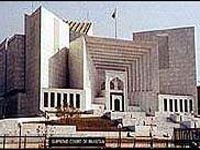Court disqualifies top opposition leaders from holding office
 Islamabad - Pakistan's Supreme Court on Wednesday maintained the disqualification of former prime minister and opposition leader Nawaz Sharif from holding elected office because of his previous convictions, a move that could lead to political turmoil.
Islamabad - Pakistan's Supreme Court on Wednesday maintained the disqualification of former prime minister and opposition leader Nawaz Sharif from holding elected office because of his previous convictions, a move that could lead to political turmoil.
The court ruling also nullified the last year's election of his brother Shahbaz Sharif, the chief minister of country's most-populous and prosperous eastern province of Punjab.
The verdict came as the rift widened between Sharif and President Asif Ali Zardari, two rivals who formed a coalition government after the February 2008 general elections that defeated former president Pervez Musharraf.
Two-time premier Sharif is the most popular leader in Pakistan and his party has the power the destabilize Zardari's government which is struggling against rising Islamic militancy.
Pakistani stocks crashed following the court decision, with the benchmark Karachi Stock Exchange 100 index losing more than 5 per cent by midday due to political uncertainties.
A spokesman for Sharif's party, the Pakistan Muslim League-Nawaz (PML-N), blasted the ruling as a political decision.
"These are kangaroo courts and we don't care. The decision has no value to the people of Pakistan, the real jurists," Siddiqul Farooq said.
Sharif's party regards the sitting top judges as "hand-picked" by Musharraf after he deposed independent-minded chief justice Iftikhar Chaudhry in November 2007, when the court was about to rule against his re-election.
The PML-N supports lawyers calling for Chaudhry's reinstatement, and pulled out of the coalition in the wake of Zardari's hesitance to reverse Musharraf's decision.
Sharif was convicted on several charges after his government was toppled in 1999 by the then-army chief Musharraf in a military coup. He was pardoned later but exiled only to return after more than seven years just prior to last year's elections.
A three-member bench of Lahore High Court barred Sharif from contesting elections last year on the basis that he was pardoned but that the convictions still stood. The Wednesday ruling by the Supreme Court upheld that decision. (dpa)